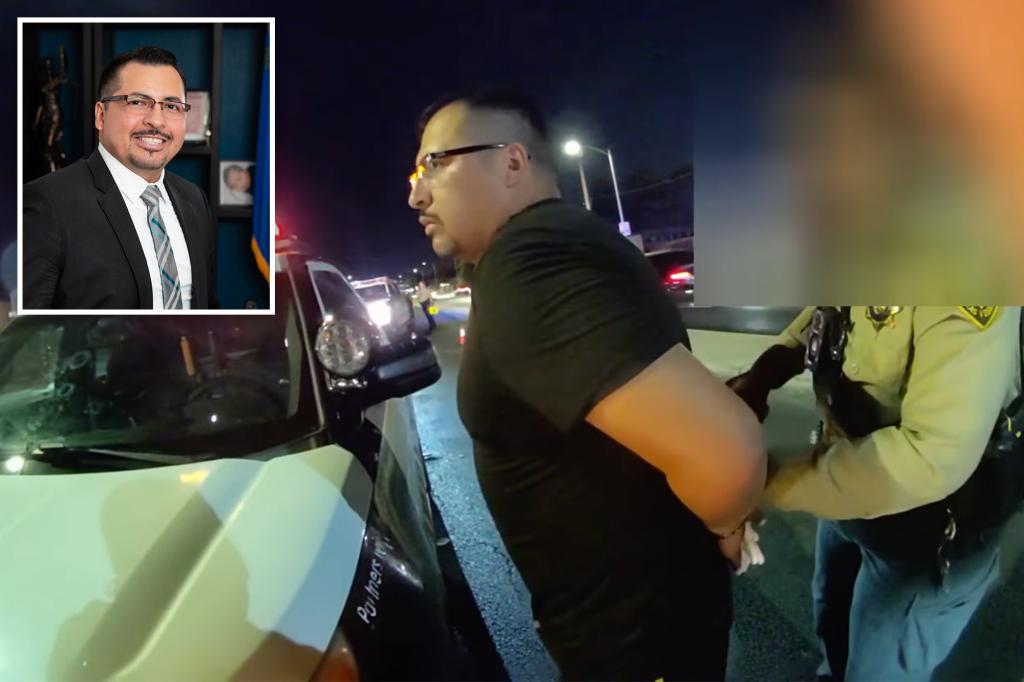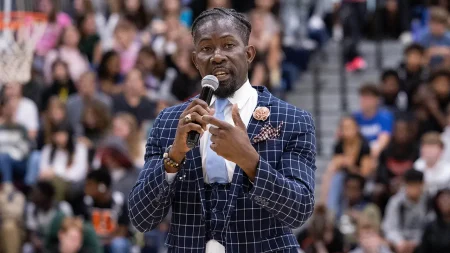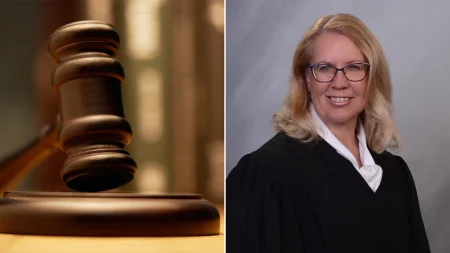Nevada Senator’s Late-Night Traffic Stop: A Moment of Fatigue or Something More?
In the quiet hours of a September morning, Nevada State Senator Edgar Flores found himself at the center of an incident that would raise questions about public officials, responsibility, and the thin line between exhaustion and impairment. The 39-year-old Democratic lawmaker representing northeastern Clark County was discovered by Las Vegas Metro Police officers apparently asleep at the wheel of his Jeep Wrangler, stopped at a red light in Northeast Las Vegas. The vehicle was in drive, his foot on the brake, keys in the ignition—a concerning tableau that would quickly evolve into a situation with potential legal and political ramifications. The early morning encounter on September 12 was captured on police body cameras, documenting a moment that many public servants would prefer to avoid.
The footage reveals officers approaching the unresponsive senator, attempting to open his door and using flashlights before finally rousing him with a knock on the window. Startled awake, a visibly disoriented Flores complied with instructions to put his vehicle in park and step outside. When questioned about his whereabouts that evening, he explained he had been playing soccer at Sunset Park and was heading home to northern Las Vegas, though he seemed to struggle recalling his exact address. When asked directly about his consumption of alcohol, Flores acknowledged having “just a drink”—later specifying “one beer” around midnight. Upon checking his identification and realizing they were dealing with a state senator, one officer specifically instructed his colleague to ensure they ran Flores “through all the tests,” perhaps recognizing the sensitivity of the situation.
What followed was a field sobriety test that, according to the bodycam footage, Flores appeared to have difficulty completing successfully. After several minutes, the officers determined he had failed the test and placed him under arrest for suspicion of driving under the influence. The senator was subsequently booked into the Clark County Detention Center on a misdemeanor DUI charge. Interestingly, under Nevada state law, Flores was released from jail after a blood draw without having to post bail or appear before a judge—a procedural detail that highlights how the system processes such cases regardless of the individual’s public standing. While the arrest was made, it’s worth noting that Flores has not yet been formally charged with any crime.
In the aftermath of the incident, conflicting narratives have emerged about what truly transpired that night. Senator Flores has acknowledged his fatigue but firmly denied being impaired while driving. His team released a statement on social media characterizing the events as occurring “after a long day of work, community events, evening exercise, and a late dinner”—painting a picture of a hardworking public servant caught in a moment of exhaustion rather than intoxication. They further claimed that Flores cooperated fully with law enforcement, agreeing to both a breathalyzer and blood test, with the breath test allegedly registering 0.0. The senator’s representatives expressed confidence that the blood test results would similarly show no signs of impairment, though these results will take approximately 90 days to process according to reports from local media outlet KLAS.
This account, however, appears to be at odds with information from the Las Vegas Metropolitan Police Department, which claimed the senator refused a “preliminary breath test” at the scene. This discrepancy represents just one of several points of contention in how the events are being characterized. While Flores’ campaign stated they “respect the officers’ diligence in ensuring public safety,” they also indicated they would be “reviewing whether his rights and privacy were properly respected”—a subtle suggestion that they may contest aspects of how the traffic stop and subsequent arrest were handled. The careful wording indicates a balancing act between showing appropriate deference to law enforcement while preserving options for legal challenge.
The incident raises broader questions about public officials and accountability. Elected representatives are naturally held to high standards, expected to model the behavior they legislate for others. Yet they are also human, subject to the same frailties and misjudgments as those they represent. A late night, physical exertion, and fatigue could indeed create a situation where someone might briefly doze off at a traffic light without any substance involvement. Alternatively, the officers on scene made their determination based on their training and observations. The truth likely lies somewhere in the details that will emerge as this case progresses toward its status hearing on January 12, when decisions about filing a formal criminal complaint will be made. Until then, both Senator Flores and the public he serves remain in a state of uncertainty, waiting for the full facts to come to light and for the legal process to determine whether this was simply an unfortunate case of exhaustion or something that merits more serious consequences.











